Highlights from the 2021 AIDS Philanthropy Summit
The 2021 FCAA Summit explored what it means to be an HIV-informed funder in a world still grappling with the impact of COVID-19. The event was held virtually on November 8th and 9th.
You can find recordings and the full agenda here.
Throughout the Summit, attendees were invited to share their takeaways and ideas using the FCAA Summit “jam board.” You will see some of those reflections (or “sticky note” images) throughout this summary. Additionally, you can find a summary of attendee reactions via this twitter summary.
FCAA also invited the panelists of the closing session “Centering HIV Positive Leadership in Philanthropy” to record brief introductory videos to share their stories as a way to begin each Summit panel. You can find the collection of those stories online here.
“We have so much power in our stories. When we uplift voices of PLWH, we reshape the landscape so no person living with HIV is left behind.“ PJ Moton-Poole, ViiV Healthcare
DAY 1
day 1
DAY 1
“It has been an honor to work in this amazing community of dedicated funders and advocates. It’s been a fulfilling final act in my 35-year journey of HIV work.” – John Barnes
FCAA Executive Director John Barnes opened the Summit by reflecting on his career in HIV as he prepares to retire next spring. After leading FCAA for more than 13 years, this was his final Summit as Executive Director.
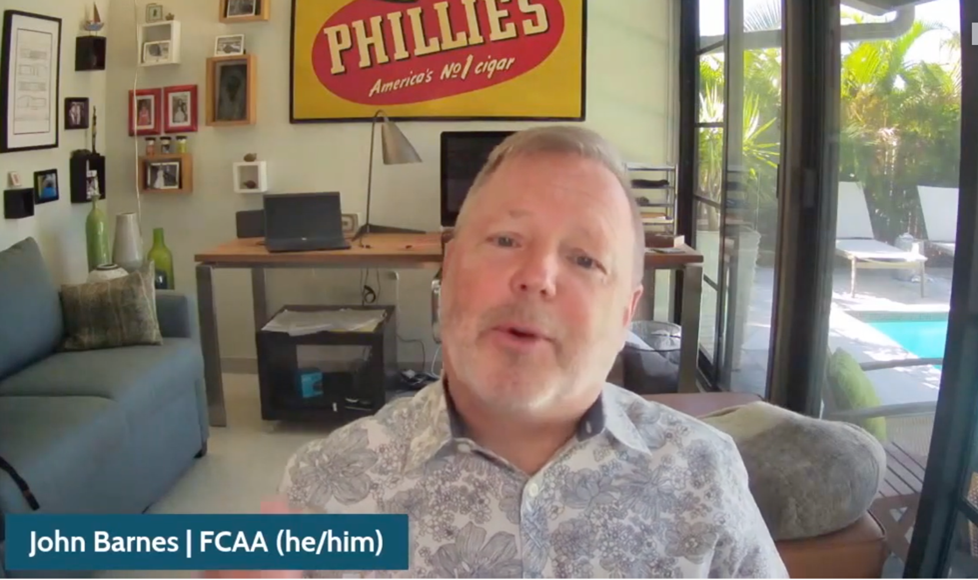
“It’s clearer than ever that—although we have made great progress treating HIV and have the tools to end the ravages of this disease—it will soon be replaced by another if we’re unable to bend the arc of the moral universe more swiftly and certainly toward justice.” – John Barnes, Executive Director, FCAA
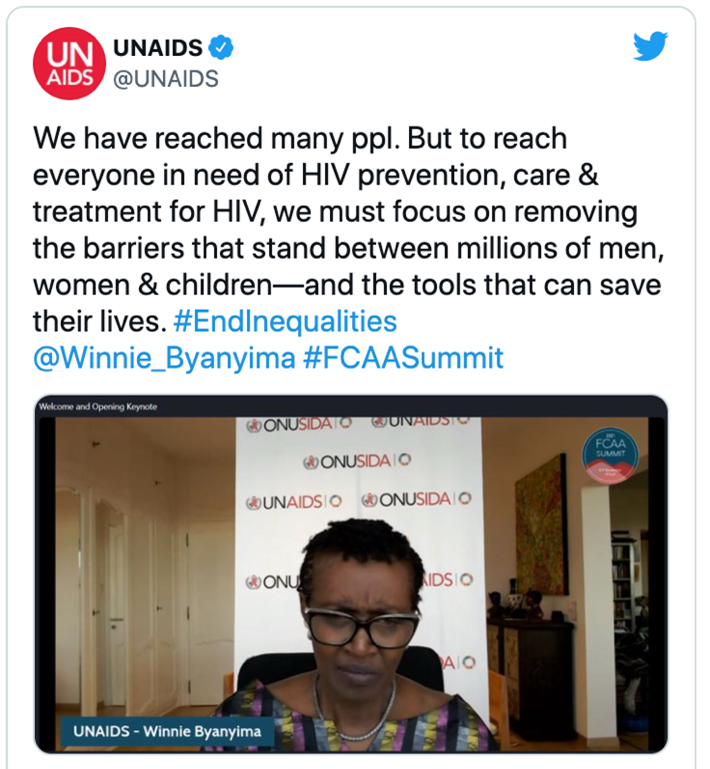
Winnie Byanyima, Executive Director of UNAIDS and Under-Secretary-General of the United Nations, went on to deliver a passionate keynote address. She said the converging pandemics of HIV and COVID-19 have created one of the most unique and challenging moments in the history of HIV and global health. To maintain the progress we’ve made in combatting HIV, she stressed that the United Nations, PEPFAR, the Global Fund, governments, philanthropy, and communities must work together to fight the inequalities that fuel these pandemics.
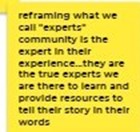
“Fighting a pandemic which has no cure and no vaccine is not easy. It will take bold political leadership, global solidarity, a commitment to human rights, a serious global plan, and strategic partnerships that engage the people most affected by the disease. We must carve a different path forward in global health. Now is the moment to do it.” – Winnie Byanyima, UNAIDS

“If you put the right investments in the right places, you get a bang for your buck. We see that with PEPFAR & the Global Fund all the time. How do we harness that lesson to end enduring #pandemics AND protect against emerging threats?” Matthew Rose, Health GAP
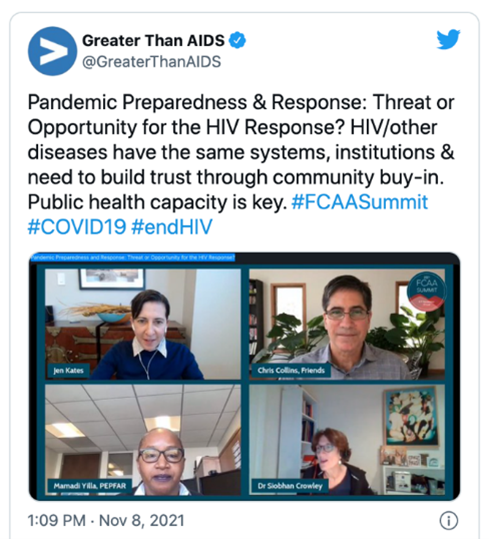
The first panel explored the challenges of ending AIDS by 2030 within the current environment of pandemic preparedness and response, using the Global Fund as a case study. Panelists shared concerns about the disruptions the pandemic has caused in the fight against HIV, leading to declines in prevention and testing.
“For the first time in the history of the Global Fund, multiple key programmatic results for HIV have gone backwards. Because of the disruptions resulting from COVID-19, those at greatest risk of HIV infection have had less access to the information and tools they need to protect themselves.” – Peter Sands, Global Fund
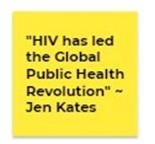
While COVID-19 has threatened progress, panelists said it has also highlighted the resilience of the HIV response, brought opportunities for innovation, and generated more funding and awareness around pandemic preparedness. In some cases, the pandemic has made it easier to take HIV self-tests and receive medications without visiting a clinic, said Siobhan Crowley, Head of HIV at The Global Fund. “We have many ways of engaging now, and many more success stories to share.”

Ending HIV in the US: A National Leadership Discussion
The second session focused on the Biden administration’s plans and priorities for addressing HIV in the U.S., and how those goals align with private sector efforts. Panelists agreed that the new presidential administration and reinstated Office of National AIDS Policy provides valuable opportunity to act to address HIV. To fight the epidemic, speakers called for robust and meaningful partnership with people living with HIV.
“We must address quality of life issues for people living with HIV consistently. We need real, long-term, structural solutions that will lift up communities that are disproportionately affected by HIV.” – Naina Khanna,Co-Executive Director of the Positive Women’s Network
Dr. Jonathan Mermin, Director of the National Center for HIV, Viral Hepatitis, STD, and TB Prevention (NCHHSTP), called on funders to improve online communications and tackle misinformation surrounding COVID-19, which has eroded people’s trust in medical professionals, vaccines, and organizations like the CDC. Carl Baloney, Vice President and Chief Advocacy Officer at AIDS United, highlighted the importance of allocating resources to the communities who need it the most.
“It’s important that we focus on the whole epidemic and reach pockets across the country that are still being left behind.” – Carl Baloney
day 2

Day two of the conference began with a session on how philanthropy can increase investment in intermediaries, particularly those that are community-rooted and led. A recent report by FCAA found that HIV-related funding to all intermediaries accounted for just 6% of annual funding from 2017 to 2019. Funding to community-rooted funders was even lower at just 2% each year.
Matty Hart, Director of the Global Philanthropy Project, shared that his organization conducted a survey comparing funder priorities against actual progress on the ground. The results indicated that access to resources is a tremendous barrier between the two. This is where intermediary funders can serve an integral role.
“There has never been more money in global health than there is today,” explained panel moderator and global health consultant Roxana Bonnell. “Intermediary funders are able to move more quickly and to unlock those funds for the community-led groups that can have the greatest impact.”
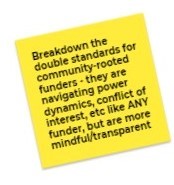
UHAI-EASHRI’s Dr. Stellah Bosire talked about the need to ensure that intermediary funders are community-rooted and inclusive of people who are directly impacted, saying “there is no better person to make decisions than those with lived experience.” Dafina Ward, Executive Director of the Southern AIDS Coalition agreed, speaking to the value of having people who live in the community involved in decision-making.
“Community-led responses are not one size fits all. Community-rooted funders define “success” with flexibility and know that “impact” looks different based on place and circumstances. ”– Dafina Ward, Executive Director of the Southern AIDS Coalition
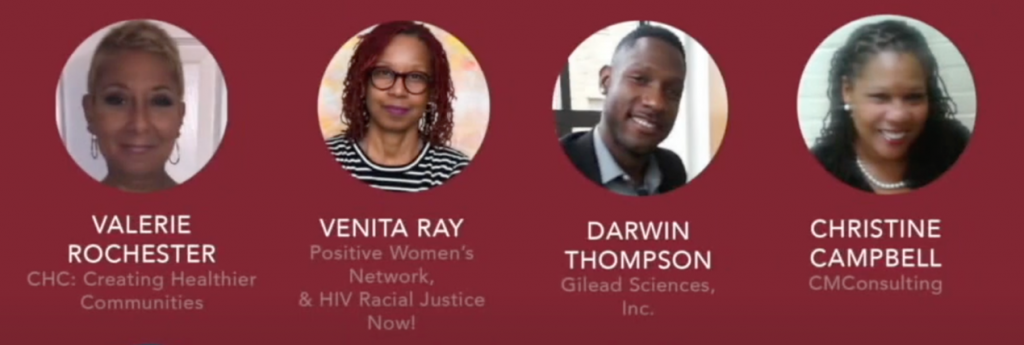
At this session, FCAA’s Racial Justice Working Group unveiled a set of racial justice guiding principles intended to change how HIV-related funders approach philanthropy. Speakers previewed the principles, discussed their development, shared community feedback, and talked about a roadmap for their adoption.
“HIV is a racial justice issue. Period. Black and Brown behavior is no different than anyone else’s, but they are still the most impacted.” – Venita Ray, Positive Women’s Network-USA and HIV Racial Justice Now!
Valerie Rochester, Chief Health Equity Officer at CHC: Creating Healthier Communities and a member of the Racial Justice Working Group, explained that this new guidancecovers four areas in which HIV-informed funders can take actionable steps to increase funding for racial equity and move toward racial justice:
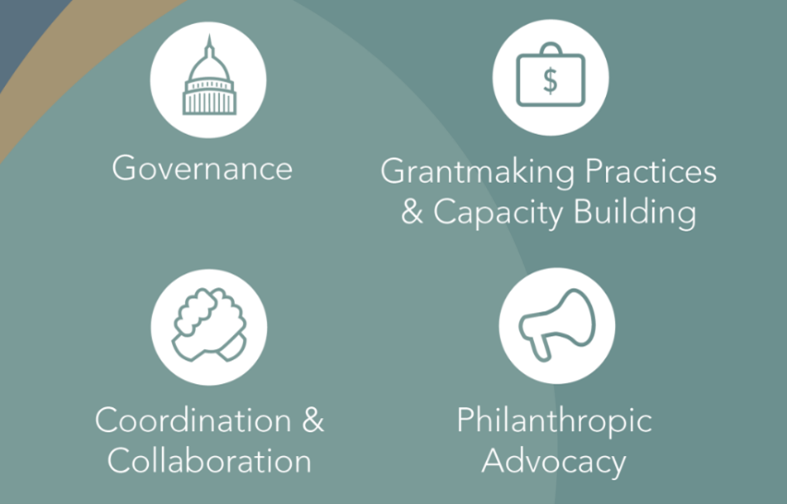
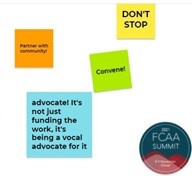
To highlight how this guidance can be taken from the theoretical to the practical, Gilead’s Darwin Thompson’s suggested: multi-year, sustained funding; investing in community-led organizations; and funding capacity building.
Racial justice in HIV is not just about treating the symptoms, explained Venita Ray. It’s about fixing the system. This new guidance is intended to help funders take a step in that direction.

“The knowledge that 36 million people have died, and that that number could have easily included me, is transformative. For me, and I think for our panelists, this is both personal and professional.” – Jesse Milan Jr., CEO of AIDS United
In a first for FCAA, this session featured a panel of HIV-positive grantmakers who shared how their lived experiences have shaped their philanthropic work. Speakers talked about juggling their different identities—whether it be Black, female, trans, gay, or HIV positive—and how those identities affect how they do their job.
Aryah Lester, Deputy Director of the Transgender Strategy Center, said she feels a moral obligation to uplift each of her stigmatized identities, not just for herself but for those in her community.
“For me, there are instances where I do throw the HIV card, just like I would throw the race card or the trans card in certain rooms when it needs to be uplifted and when it needs to be an example to other individuals,” said Lester.
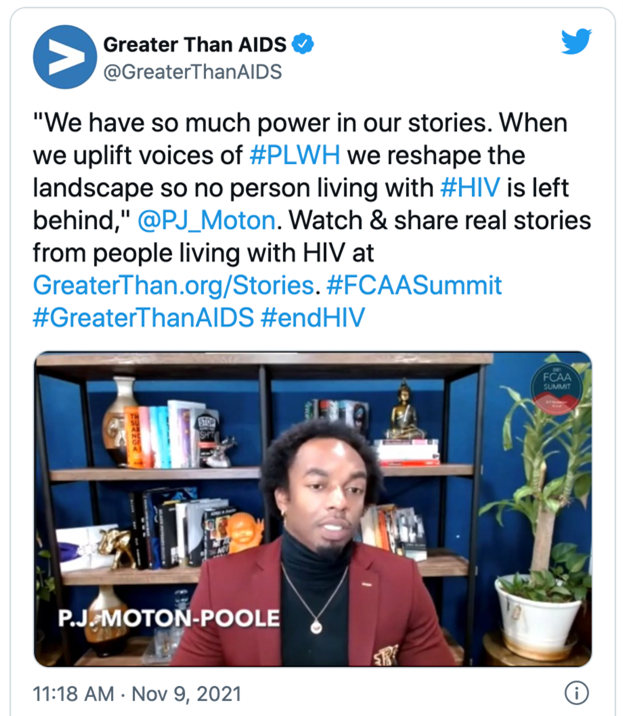
P.J. Moton-Poole, Senior Manager of External Affairs at ViiV Healthcare, said he challenges himself and others to determine their additional value, beyond their HIV status. Tom Viola, Executive Director of Broadway Cares/Equity Fights AIDS, said talking openly about his HIV status allows people to feel safe having that conversation, with each other and with themselves.
“I feel people perk up and start listening to me when I share that I’m HIV positive,” – Florence Thune, Executive Director for Sidaction.
While each of their experiences were different, all the panelists agreed that more resources should be directed towards ending the HIV epidemic and centering the voices and lived experiences of people living with HIV.
Closing Session
In the closing session, Cathy Ferrier of ViiV Healthcare and Kiyomi Fujikawa of the Third Wave Fund summarized the key themes and takeaways from the summit, with special attention paid to FCAA’s role in moving key actions forward.
Key Takeaways
- Eliminate the scarcity mindset—there is currently a record amount of public health funding
- Keep racial justice at the top of the agenda
- Increase funding to community-led and community-rooted groups & funders
- Empower those affected by HIV and invite them to guide decisions
- Fund transgender groups
- Engage youth in HIV advocacy
- Use your privilege to uplift marginalized people and voices
Jaclyn Gilstrap, a graphic facilitator with A Visual Approach, wrapped up the summit by sharing a “summary graphic recording” that captured key themes using illustration.
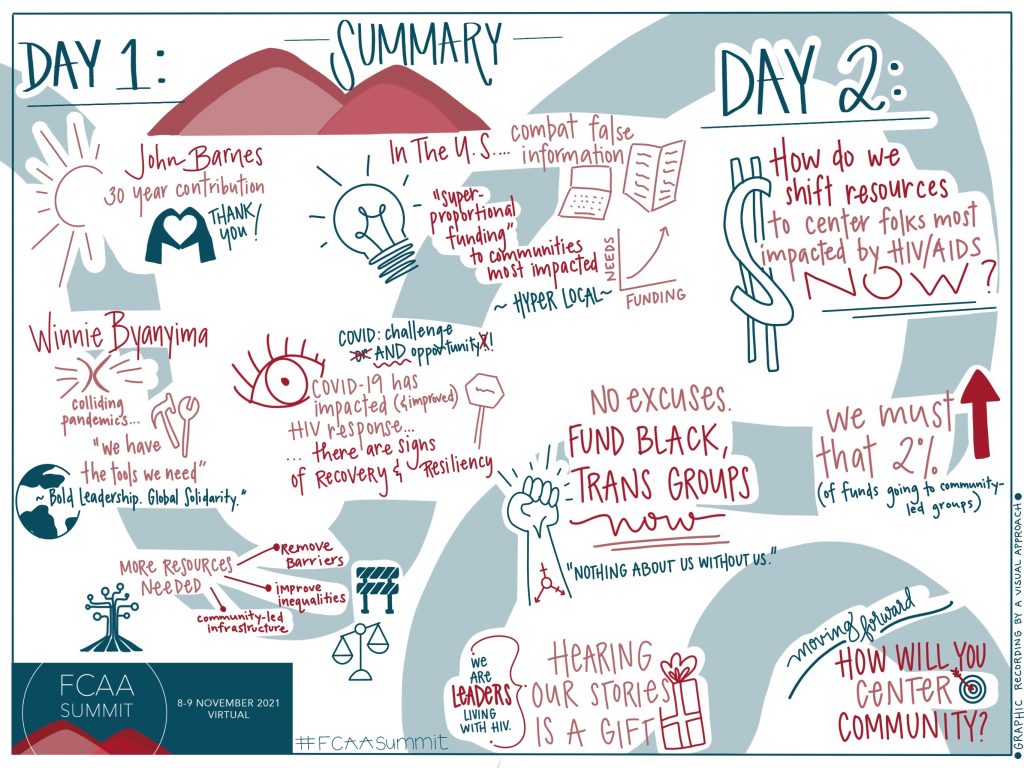
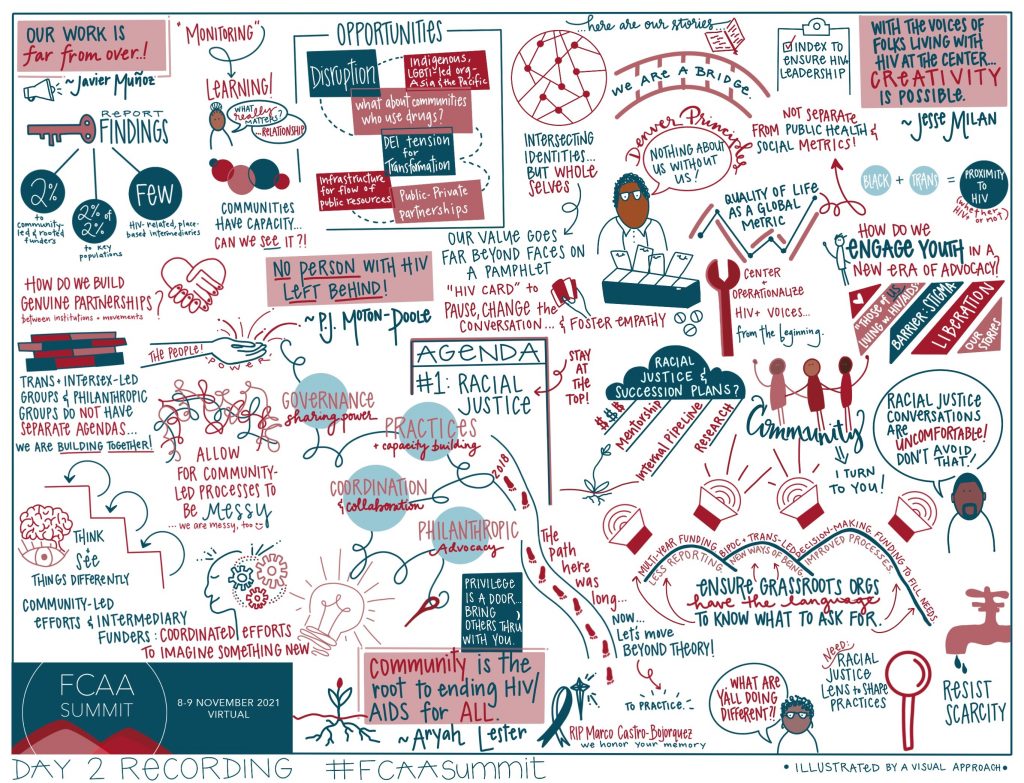
You can find recordings and the full agenda here.
